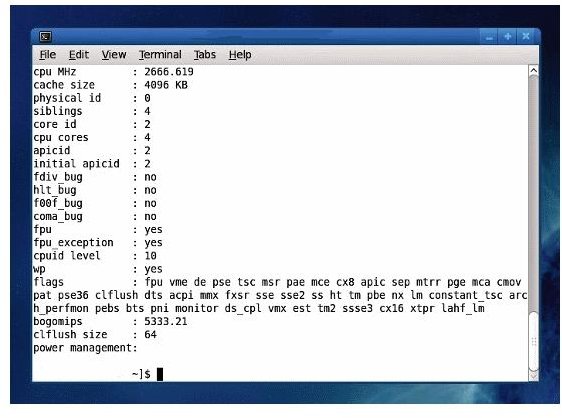
- Bash return proc cpuinfo 64 Bit#
- Bash return proc cpuinfo 32 bit#
- Bash return proc cpuinfo Patch#
- Bash return proc cpuinfo pro#
- Bash return proc cpuinfo series#
Secure Boot must be turned off and you must make sure that the computer has fully shut down and not in a hibernated state. However, most Windows™ computers come with “legacy Bios” which you can enter to enable booting a Puppy boot media (optical or USB).

My MAC has EFI is that the same as UEFI?Īt the time of writing, Puppy does not support UEFI. It is fairly inexpensive these days to replace your current harddisk with a 4 TB or even 6 TB. UEFI (Unified Extensible Firmware Interface) is a standard and is (however much a pain it is) necessary to help address the limitation of BIOS/MBR systems limit of support for hard disks above 2 TB. Most people familiar with computers have been into the BIOS setup at some point to change a setting such as boot device order or the system time. BIOS and UEFIīIOS (Basic Input/Output System) based computers have been around for a long time. See the Old Puppy Forum for more details. Puppy now has support for armhf on the Raspberry Pi family of computers, from pi zero and the original pi 1 to the latest pi 4.
Bash return proc cpuinfo 64 Bit#
There are many different arm architectures and not all are compatible armel, armhf, armv6l, armv7l, even 64 bit aarch64 or arm64. armĪrm processors are likely to be found in embedded systems such as routers, TVs, appliances and mobile phones. Ia64 is a completely different instruction set for Intel Itanium processors which Puppy does not support. Maybe it’s because AMD got there first that “amd64” caught on. X86_64, ia64, amd64 I’ve seen all these, what’s up with that?įirstly, x86_64 and _amd64 are one and the same. Pentium D and later are 64 bit processors with the exception of some Atom processors (“Diamondville” and some others). Intel’s Pentium 4 Prescott gained 64 bit support in 2004. In 2004 Intel released its first 64 bit processor “Nocona”.ĪMD Opteron, Athlon X2 and later are 64 bit processors This gives the operating system access to 64 GB of RAM natively.ĪMD were the first to come up with a 64 bit processor with their “Opteron” line in 2003. X86_64 is just x86 with 64 bit addressing capability.
Bash return proc cpuinfo pro#
Since around 2009 Puppy’s kernels have been compiled with Pentium Pro support making the operating system “i686”. I586 – The First Intel Pentiums MMX, AMD-K5 i386, i486, i586 and i686īriefly, these architectures correspond with the following CPUs: If you have less than 4GB of RAM there isn’t much point in using a PAE enabled operating system, however in most cases it will work fine anyway. This will return PAE Supported if your processor supports PAE PAE Unsupported if your processor does not. Grep -o -w -q 'pae' /proc/cpuinfo & echo "PAE Supported" || echo "PAE Unsupported" Some quite old processors do not support PAE too.Ī similar check to the 64 bit test above can be performed to determine your processors PAE capabily: It is a limited few but a notable one is the Intel Centrino with 400MHz FSB.
Bash return proc cpuinfo 32 bit#
Some 32 bit processors have not got PAE capability set in their instructions.
Bash return proc cpuinfo Patch#
This switches on the PAE patch and subsequently the operating system is capable of “seeing” up to 64 GB of RAM, however, any one process is still restricted to using up to 4 GB of RAM. When a kernel is configured there is an option to enable higher memory.

Normally, a 32 bit operating system is limited to “seeing” 4 GB of RAM. PAE (Physical Address Extension) is a patch to the Linux Kernel. To PAE or not to PAE That is the question! That test will return 64 bit if your processor is capable or 32 bit otherwise. Grep -o -w -q 'lm' /proc/cpuinfo & echo "64 bit" || echo "32 bit" Here is a simple test we have devised if you are running Linux: If you are unsure what type of processor you have a 32 bit Puppy is a safe bet and once running there are various ways to determine the architecture of your processor.

A 32 bit operating system will run on an x86 or an x86_64 processor but a 64 bit operating system will not run on an x86 processor. Generally when we refer to “x86” we are talking about “32 bit”.
Bash return proc cpuinfo series#
Technically speaking, any Intel 8086 processor is x86! This includes the old 286, 386 and 486 series however it wasn’t until the 386 that “32 bit” registers came into effect. If you are finding it tough deciding which Puppy to download for your machine read on. Some later PIII and Athlon machines should cope. Puppy will not (likely) run on an old 486, or even an old PI. Generally, these are manufactured by Intel and AMD and some smaller companies such as VIA and earlier on Cyrix. Puppy Linux as of November 2015 supports both x86 and x86_64 CPU architectures.


 0 kommentar(er)
0 kommentar(er)
